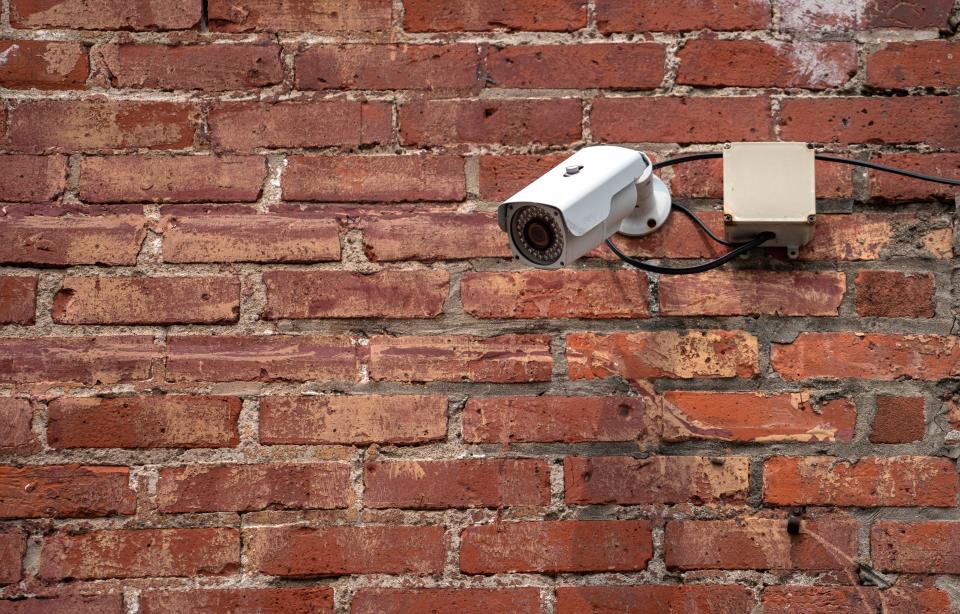B-link cameras were pitched as a safety measure for Indy businesses. Are they working?
Since a public launch in 2020, b-link cameras and signs announcing their presence have slowly made their way to businesses in downtown Indianapolis and the surrounding area.
B-link, short for business link, is a public safety program engineered by the Indianapolis Metropolitan Police Department and the Indy Public Safety Foundation. Indianapolis businesses who sign up for the program have at least two of the cameras installed on their property.
The cameras are designed to give IMPD’s Incident Analysis Center livestream access if a crime takes place near them, along with recorded video evidence for investigations.
IMPD Deputy Chief Kendale Adams said the purpose is to be more efficient in responding to crimes and involve the community in keeping the city safe.
“Oftentimes, I go to community meetings and people say, ‘Well, how can we help?’” Adams said.
This program is intended to be an answer to that question.
Although the program hasn’t grown at the rate he expected, Adams said it has helped solve crimes ranging from murders to graffiti downtown, noting the cameras are used for crime-solving at least three to four times a month.
'Every week I'm seeing wins'
One of those instances involved a shooting where the b-link cameras were used to find a suspect who had shot three Dutch soldiers visiting Indianapolis, killing one of them. Adams said the camera captured the suspect’s truck and, with the addition of license plate reader technology, led to an arrest.
“While we don’t see it every day, there have been successes,” Adams said. “Every week I’m seeing wins.”
Another instance involved police using b-link cameras stationed at a Big Red Liquors to capture footage of a suspect’s car who had allegedly robbed a business next door.
Jennifer Velasco is a part-owner of The Bungalow, a Broad Ripple business that began participating in the b-link program in 2022. The business had a shooting in the parking lot in 2021, which broke one of their windows, and a robbery in 2022, which played into the decision to join the program, Velasco said.
Since the cameras arrived, fewer people have been hanging out in the business’ parking lot at night, which she attributes to the presence of b-link. She said more businesses in the city should employ the cameras.
“Unfortunately, it’s an expense we have to have right now,” Velasco said.
The Rev. David Greene Sr., senior pastor at Purpose of Life Ministries, is still evaluating whether joining the b-link program will be beneficial for his parish. He said the concept sounds good but it is still unclear to him whether the program will actually improve IMPD’s response times.
“If it’s not going to do that, then it’s going to be problematic,” he said.
He also wonders about spending additional money on the system when he already has other security cameras in place.
Although some businesses and IMPD have touted the b-link program as effective, there is currently no publicly available data or studies to back that up and the program is still only a few years old. For now, much of the data is anecdotal.

Privacy concerns persist
The Indianapolis program took inspiration from other public safety programs in New Orleans and Detroit. Detroit’s program, known as Project Green Light, is a camera program used to deter crime in the city, though it differs from Indianapolis’ in that it involves facial recognition technology along with physical green lights placed on stores.
The project has faced much scrutiny due to cases of suspect misidentification, with two instances involving Black men being arrested for crimes they didn’t commit. Community advocates fear the technology is dangerous because of studies showing the technology can struggle to correctly identify the faces of people of color.
Adams said IMPD chose not to use any facial recognition, referencing the misidentification issues in Detroit.
“We collect no data on cameras that would lead to misinformation,” Adams wrote in an email. “So I have no concerns on misidentification.”
A study conducted in 2021 said Project Green Light likely contributed to a “significant” decline in crimes such as carjackings, robberies, and shootings since 2016, but other public safety initiatives also may have played a role in the decline.
Jesse Brown, a Democrat running for election for an open seat in City-County Council District 13 against Libertarian candidate Elizabeth Glass, said he is glad people are inventing new public safety initiatives, but he worries about giving the police free rein to access camera data.
“In our society, mass surveillance has now become widespread,” Brown said. “These things I think just need to be carefully thought out.”
Brown said privacy could become an issue with the adoption of the b-link camera program.
“You shouldn’t have to worry that authoritarian systems are being set up that could be misused by people,” Brown said.
He said any data that is collected should be publicly available so it can be audited and there should be more assurances about what data is being used and who has access to it.
Adams said in response to concerns about privacy that since these business cameras are in publicly accessible places, there is already no expectation of privacy there.
In addition, officers who have access to the live stream feeds from the cameras must sign a user agreement and participate in a training before that access is gained. This is to ensure they understand how to properly use the technology and do not abuse it. All camera usage is also audited, and if an officer is found in violation, he or she can face disciplinary action and be removed from the program.

IMPD anticipates rapid expansion of b-link
The b-link program had just three businesses when it first began a few years ago but has now grown to around 100.
IMPD has had two grant cycles so far offering installation cost coverage for businesses who wanted to enter the program. The price is, on average, around $1,800 for installation and then a $21 to $25 monthly fee for cloud storage per camera and any maintenance plans.
Adams said the department has budgeted for seven analysts and a supervisor in the process of turning the Incident Analysis Center into a real-time crime center. Those analysts will be assigned to watch b-link cameras, allowing for more time spent surveilling the growing number of Indianapolis businesses in the program.
In addition, IMPD is hoping to bring b-link to smaller businesses and more residential areas, along with getting overall costs down for the technology to cut down barriers to access.
Adams expects in the next six months around 250 more businesses will join the program.
This article originally appeared on Indianapolis Star: B-link: Police pitched cameras to make Indy safer. Are they working?

